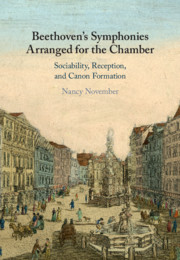Book contents
- Frontmatter
- Frontmatter
- Contents
- Illustrations
- Tables
- Musical Examples
- Acknowledgements
- Introduction
- 1 ‘A Fruitful Age of Arrangements’
- 2 Arrangers and Authority
- 3 Selling Arrangements, Constructing the Canon
- 4 Beethoven and Steiner’s Plan
- 5 Musical Arrangements and Musical Works
- 6 ‘Completely Absorbed by the Piano’
- Epilogue
- Bibliography
- Index
5 - Musical Arrangements and Musical Works
Published online by Cambridge University Press: 21 May 2021
- Frontmatter
- Frontmatter
- Contents
- Illustrations
- Tables
- Musical Examples
- Acknowledgements
- Introduction
- 1 ‘A Fruitful Age of Arrangements’
- 2 Arrangers and Authority
- 3 Selling Arrangements, Constructing the Canon
- 4 Beethoven and Steiner’s Plan
- 5 Musical Arrangements and Musical Works
- 6 ‘Completely Absorbed by the Piano’
- Epilogue
- Bibliography
- Index
Summary
This chapter further explores the ontological status of Beethoven’s symphonies in the early-mid nineteenth century, with particular attention to commentators’ ideas about arrangements of these symphonies, which both supported and undermined the development of the concept of musical works. Reading further in journals and newspapers of this time, one develops a fresh understanding of how symphonies were—and were not—understood as musical works in the early nineteenth century. The arrangers considered here are Ries and especially Hummel, two contemporaries of Beethoven who made numerous well-received arrangements of Beethoven’s music. Their musical arrangements, and others of the time, contributed to the development of the concept of the musical work concept around 1800 by promoting a certain kind of engaged ‘Romantic listening’. Such listening celebrated the creativity and genius of the composer and the unity of the work; by establishing the fixity and untouchability of the composer’s text, so that arrangements were considered ‘derivatives’; and by encouraging the perseverance of works, providing an aide-mémoire for listeners wishing to recall concert performances.
- Type
- Chapter
- Information
- Beethoven's Symphonies Arranged for the ChamberSociability, Reception, and Canon Formation, pp. 153 - 192Publisher: Cambridge University PressPrint publication year: 2021

